ISSN 2799-0559 Volume 11, No. 1, March 2024 CONTRIBUTORS THE ROLE OF EDUCATION IN EMPOWERING FILIPINO LEARNERS 2 |1 JUDY ROMEROSA DELA CRUZ PERCEPTION OF TVL-ICT GRADE 12- MACINTOSH STUDENTS ON THE IMPLEMENTATION OF MODULAR DISTANCE LEARNING IN LEYTE NATIONAL HIGH SCHOOL AMIDST COVID-19 5 PANDEMIC, S.Y. 2021-2022 LORENZO NIÑO G. VILLACORTE III UNVEILING THE BEAUTY OF ALGEBRA: A GATEWAY TO MATHEMATICAL MASTERY 8 MARISSA P. AMAMANGPANG INTERVENTION SCHEME OF THE SYNTACTIC AND MORPHOLOGICAL ERRORS IN THE WRITTEN COMPOSITION OF SENIOR HIGH SCHOOL STUDENTS UNDER THE SCIENCE, TECHNOLOGY ENGINEERING, AND MATHEMATICS STRAND 11 PEARLY ANN C. JERVOSO EDUCATIONAL EVOLUTION: THE TRANSFORMATION OF LEARNING METHODS 13 VANESSA B. PAMARANG ZALDY C. DE LEON JR., LPT, MDiv, MA, PhD Editor-in-Chief Copyright for this article is retained by the author(s), with first publication rights granted to the journal. This is an open-access article distributed under the terms and conditions of the Creative Commons Attribution license http://creativecommons.org/licenses/by/4.0/ CC-BY

ISSN 2799-0559 Volume 11, No. 1, March 2024 The Role of Education in Empowering Filipino Learners JUDY ROMEROSA DELA CRUZ Department of Education Education is the cornerstone of a nation's progress, and the pursuit of excellence within its educational system is crucial for the holistic development of its learners. In the Philippines, a country known for its rich cultural heritage and resilient people, the quest for excellence in education has been a focal point in driving societal advancement and individual empowerment. This article explores the significance of education in nurturing excellence among Filipino learners and the various initiatives aimed at fostering a culture of academic and personal growth. Education serves as the key that unlocks opportunities and empowers individuals to reach their full potential. In the context of the Philippines, where access to quality education has been a longstanding challenge, recognizing the importance of education is paramount. Beyond acquiring knowledge and skills, education instills values, fosters critical thinking, and promotes lifelong learning. It equips learners with the tools necessary to navigate the complexities of the modern world and contribute meaningfully to society. Excellence is not merely about achieving high grades or academic accolades; it encompasses a mindset of continuous improvement, resilience, and the willingness to push boundaries. In the Filipino context, the pursuit of excellence is deeply ingrained in the cultural fabric, often referred to as "excellence through resilience." Despite facing numerous socio-economic challenges, Filipino learners exhibit remarkable determination and resourcefulness in their pursuit of academic and personal success. Copyright for this article is retained by the author(s), with first publication rights granted to the journal. This is an open-access article distributed under the terms and conditions of the Creative Commons Attribution license http://creativecommons.org/licenses/by/4.0/ CC-BY |2

ISSN 2799-0559 Volume 11, No. 1, March 2024 While the Philippines boasts a vibrant educational landscape, it is not without its challenges. Issues such as inadequate infrastructure, insufficient funding, and disparities in access to quality education persist, particularly in remote and marginalized communities. Additionally, the prevalence of rote memorization and standardized testing | 3 can stifle creativity and critical thinking skills among learners. However, amidst these challenges lie opportunities for innovation and reform. The Philippine government, along with various stakeholders, has been implementing initiatives to enhance the quality and inclusivity of education. This includes the K to 12 Basic Education Program, which aims to provide learners with a more holistic and skillsbased curriculum, and efforts to integrate technology into teaching and learning processes. Empowering Filipino learners to excel requires a multifaceted approach that addresses not only academic needs but also socio-economic barriers and personal aspirations. Providing equal opportunities for education, regardless of background or circumstance, is essential in unlocking the potential of every Filipino learner. This involves investing in teacher training, improving school facilities, and promoting community engagement in education. Furthermore, fostering a culture of excellence entails nurturing the holistic development of learners. Emphasizing values such as integrity, empathy, and resilience alongside academic pursuits helps instill a sense of purpose and character in students. Moreover, encouraging innovation, creativity, and critical thinking cultivates the skills needed to thrive in an ever-changing global landscape. Education plays a pivotal role in shaping the future of the Philippines, and the pursuit of excellence among its learners is paramount in driving progress and prosperity. By investing in quality education, empowering learners, and fostering a culture of excellence, the Philippines can unlock the full potential of its people and pave the way for a brighter Copyright for this article is retained by the author(s), with first publication rights granted to the journal. This is an open-access article distributed under the terms and conditions of the Creative Commons Attribution license http://creativecommons.org/licenses/by/4.0/ CC-BY
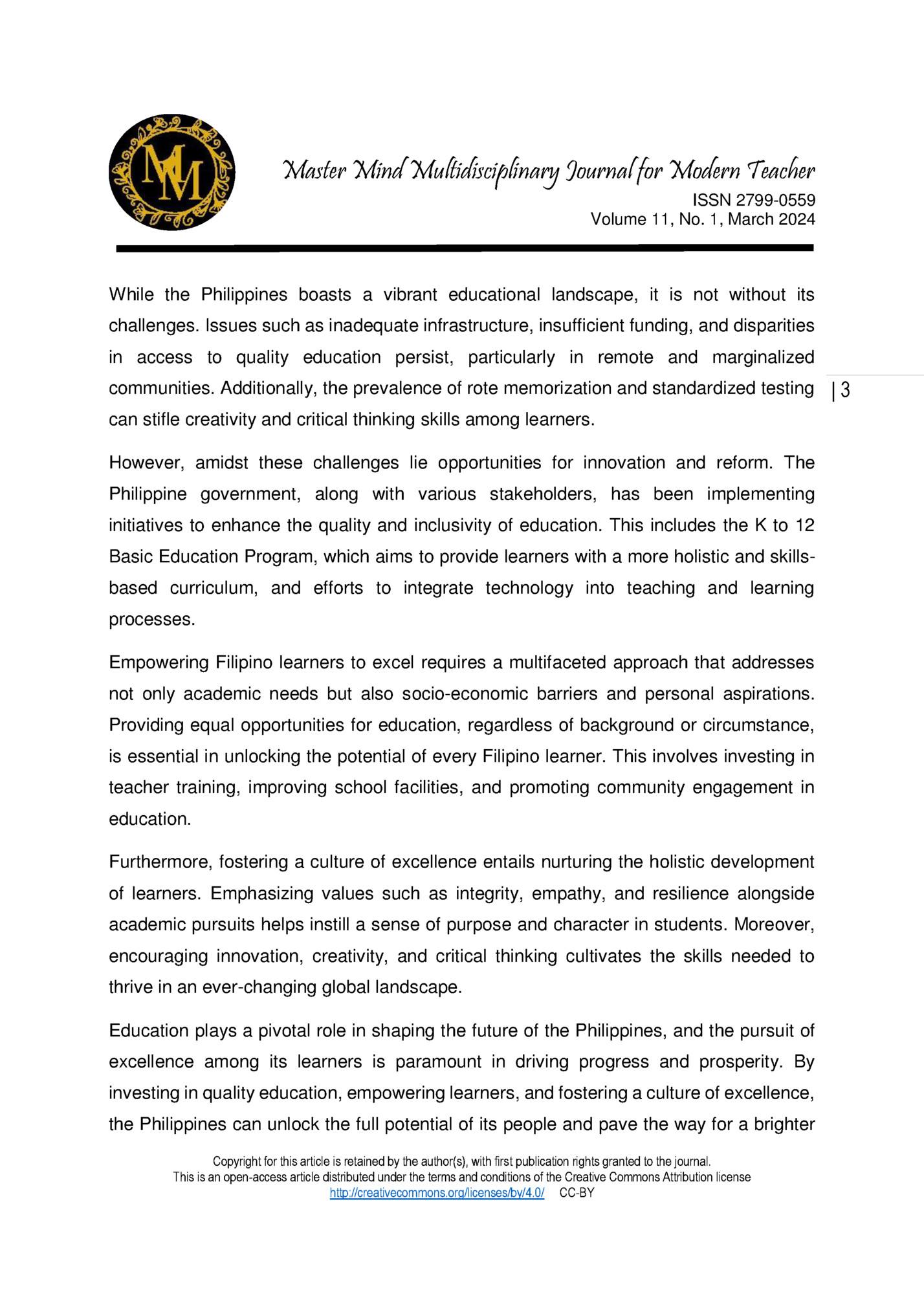
ISSN 2799-0559 Volume 11, No. 1, March 2024 tomorrow. As Filipino learners continue their journey towards excellence, let us support and nurture their aspirations, for they are the architects of a better nation. |4 References: Mehdiratta, L., Bajwa, S. J. S., & Kurdi, M. S. (2022). In pursuit of excellence in anaesthesia education…. vision, challenges and opportunities. Indian Journal of Anaesthesia, 66(1), 3. Osenk, I., Williamson, P., & Wade, T. D. (2020). Does perfectionism or pursuit of excellence contribute to successful learning? A meta-analytic review. Psychological assessment, 32(10), 972. Gaudreau, P., Schellenberg, B. J., Gareau, A., Kljajic, K., & Manoni-Millar, S. (2022). Because excellencism is more than good enough: On the need to distinguish the pursuit of excellence from the pursuit of perfection. Journal of Personality and Social Psychology, 122(6), 1117. Tilak, J. B. (2023). Reforming Higher Education in India in Pursuit of Excellence, Expansion, and Equity. Rees, E., Guckian, J., & Fleming, S. (2021). Fostering excellence in medical education career pathways. Education for Primary Care, 32(2), 66-69. Rees, E., Guckian, J., & Fleming, S. (2021). Fostering excellence in medical education career pathways. Education for Primary Care, 32(2), 66-69. Copyright for this article is retained by the author(s), with first publication rights granted to the journal. This is an open-access article distributed under the terms and conditions of the Creative Commons Attribution license http://creativecommons.org/licenses/by/4.0/ CC-BY
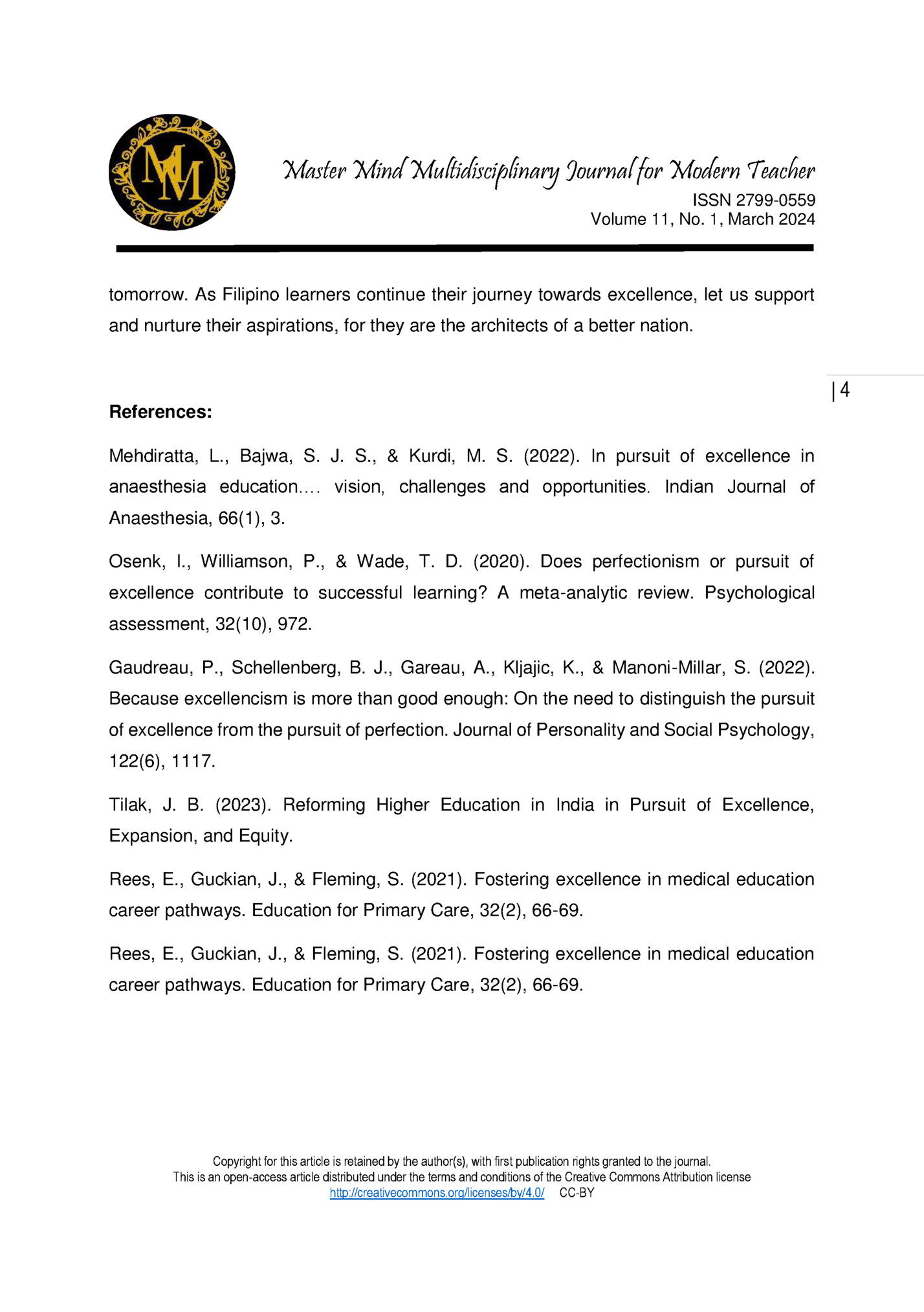
ISSN 2799-0559 Volume 11, No. 1, March 2024 Perception of Tvl-Ict Grade 12- Macintosh Students on the Implementation of Modular Distance Learning in Leyte National High School Amidst Covid-19 Pandemic, S.Y. 2021-2022 LORENZO NIÑO G. VILLACORTE III Department of Education Abstract Distance learning is not a new modality in delivering education, it is already used as an alternative to learners whose circumstances make attending regularly to school difficult. Module-based alternative delivery modality (ADM) is the most commonly used for learners having difficulty attending regular classes at schools. This is also used by the Alternative Learning System (ALS) which caters to out-of-school children and youth who would like to pursue education despite their circumstances. Specifically, the BE-LCP of DepEd defines distance learning as a learning delivery modality where learning takes place between the teacher and learners who are geographically remote from each other during instruction and is comprised of different modes, namely modular distance learning, online distance learning, and tv/radio-based instruction. In this study, the main purpose to find out the perception of TVL-ICT Grade 12 Macintosh Students on the implementation of Modular Distance Learning in the Leyte National High School amidst Covid-19 Pandemic, S.Y. 2021-2022. The study focused on the perception of TVL-ICT students of Grade 12 Macintosh on the implementation of modular distance learning modality. The study was conducted at the Leyte National High School, Schools Division of Tacloban City. The participants of the study are the 30 students of TVL-ICT Copyright for this article is retained by the author(s), with first publication rights granted to the journal. This is an open-access article distributed under the terms and conditions of the Creative Commons Attribution license http://creativecommons.org/licenses/by/4.0/ CC-BY |5
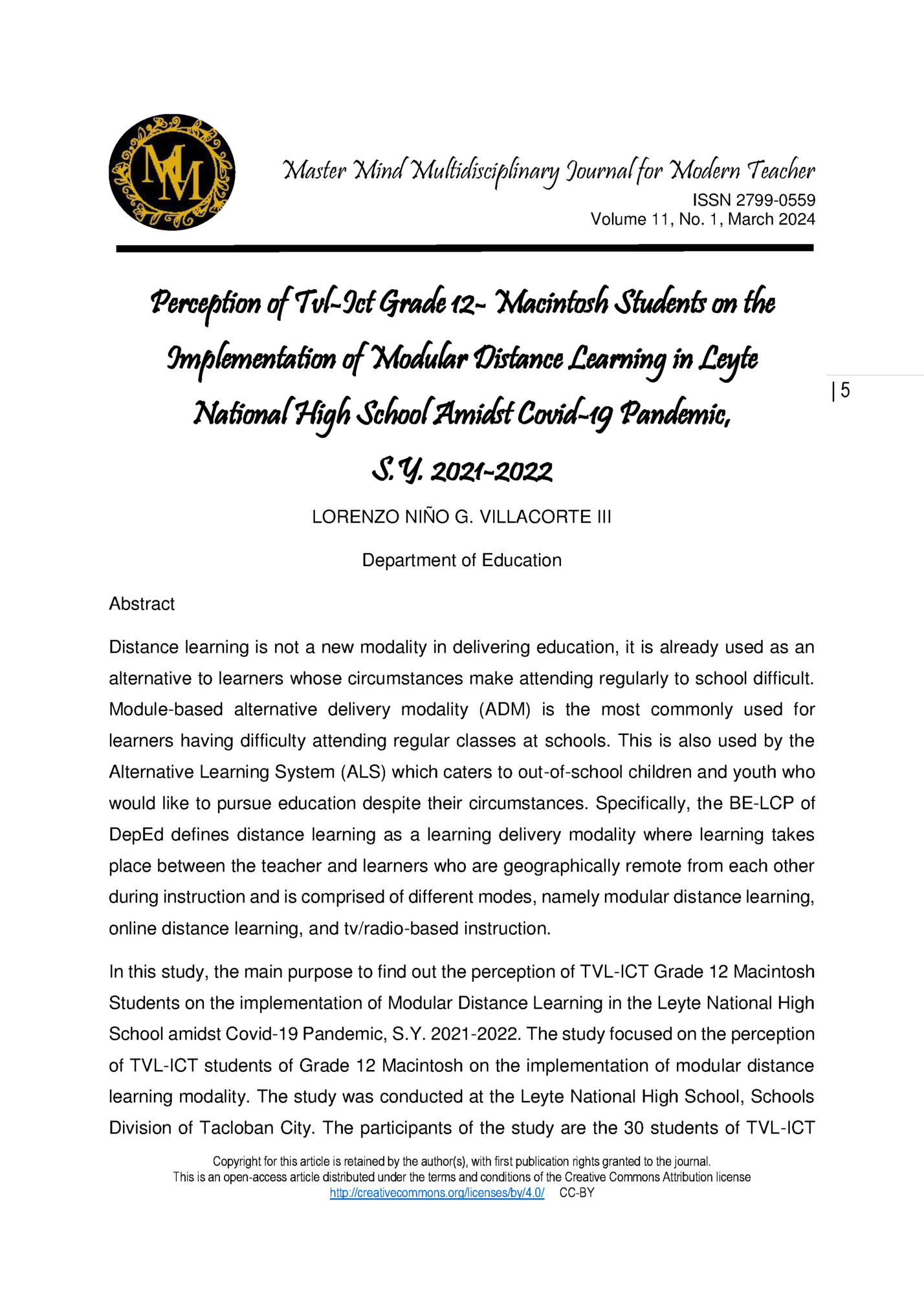
ISSN 2799-0559 Volume 11, No. 1, March 2024 Grade 12 Macintosh. A survey instrument used in the study is a self-made questionnaire on the perception of TVL ICT Grade 12 Macintosh Students on modular-distance learning modality. Results showed that 2 or 6.67 percent of the respondents belong to the age bracket of 20 | 6 years old, 4 or 13.33 percent where under the age bracket of 19 years old, 6 or 20.00 percent belong to 18 years old and 18 or 60.00 belonged to 17 years old. The results also revealed that 26 or 86.67 percent were males, outnumbering their female counterparts with only 4 or 13.33 percent. It could be noted that most of the respondents were males. Furthermore, results showed that “Learning on your pace” depict with a 53.33 percentage, “Ability to stay at home” indicate 23.33 percentage, “Class interactivity” illustrate a 13.33 percentage while the rest of the indicators on "Comforting surroundings” falls on 10.00 percentage. This implies that as Modular Distance Learning is being implemented, TVLICT Grade 12 Macintosh students enjoy learning at their own pace. Likewise, results showed that “Reduced interaction with teacher” depict with a 63.33 percentage, “Poor learning conditions at home” indicate 16.67 percentage, “Technical problems” illustrate a 10.00 percentage while the rest of the indicators on "Lack of interactions with parents” falls on 6.67 percentage. This implies that as Modular Distance Learning is being implemented, TVL-ICT Grade 12 Macintosh students pointed out that reduced interaction with the teacher is the main disadvantage of Modular Distance Learning. Also, results showed that “Effectiveness of modular learning in terms of increasing knowledge”, “Effectiveness of modular learning in terms of increasing social competence” and “Describe your activity during modular learning” indicate “Low” results while “Effectiveness of traditional face-to-face learning in terms of increasing clinical skills” and “Effectiveness of traditional face-to-face learning in terms of increasing social competencies” fall under “High”. While “Rate how much did you enjoy modular learning Copyright for this article is retained by the author(s), with first publication rights granted to the journal. This is an open-access article distributed under the terms and conditions of the Creative Commons Attribution license http://creativecommons.org/licenses/by/4.0/ CC-BY
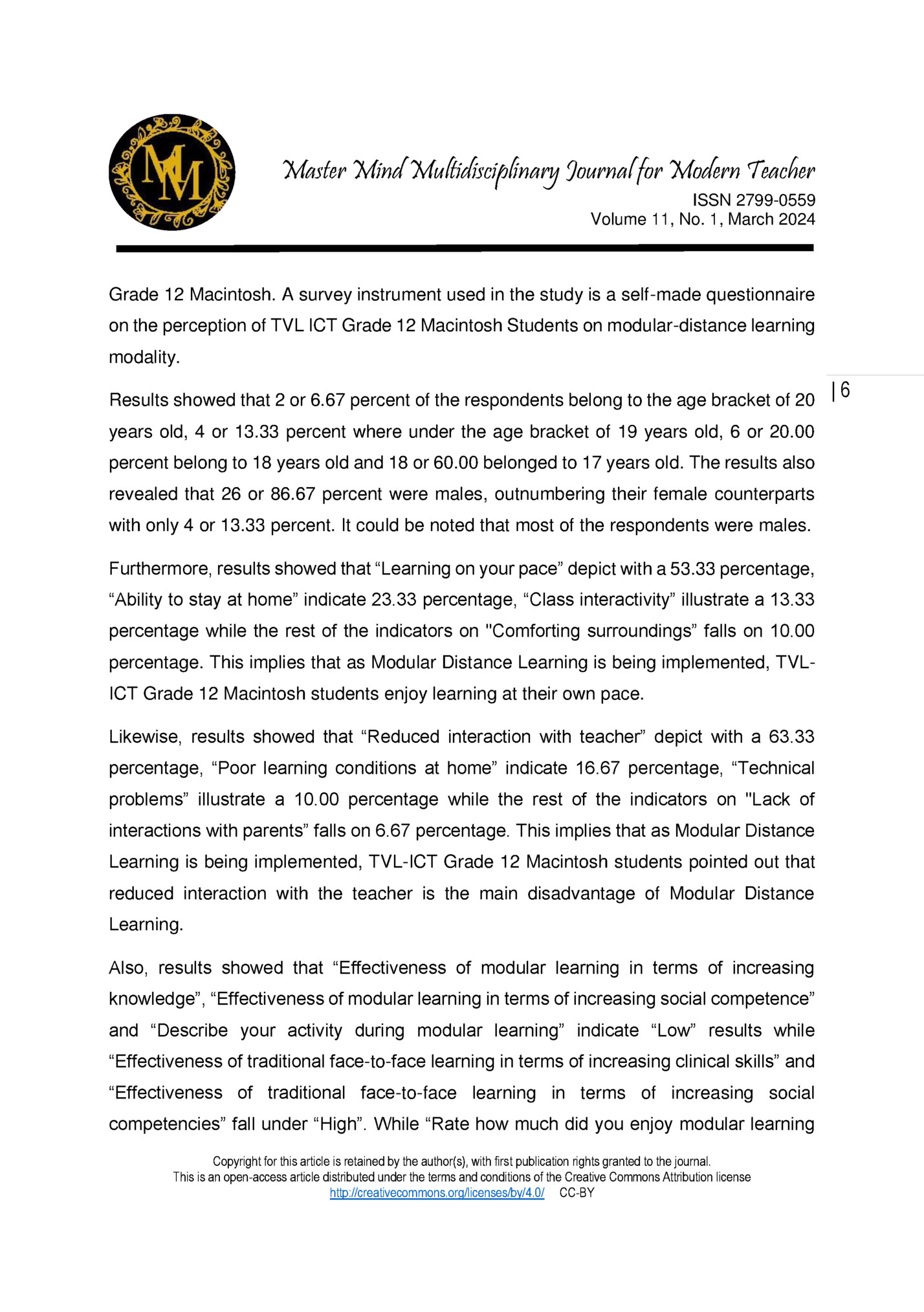
ISSN 2799-0559 Volume 11, No. 1, March 2024 classes during the pandemic” indicate “Moderate”. An average of 2.57 signifying the effectiveness of modular learning as “MODERATE”. Students learned and engaged with the support of modules, which increased their interest in their very own learning. Students who were taught using a modular approach | 7 had significantly higher scores than students who were taught using an activity-oriented method. They learn something new and apply what they've learned through their own. Students gain a new perspective from their own achievements, allowing them to build new abilities. Learning through modular instruction allows students to take care of their own studies. Complete Studies is available upon request to the researcher. Copyright for this article is retained by the author(s), with first publication rights granted to the journal. This is an open-access article distributed under the terms and conditions of the Creative Commons Attribution license http://creativecommons.org/licenses/by/4.0/ CC-BY
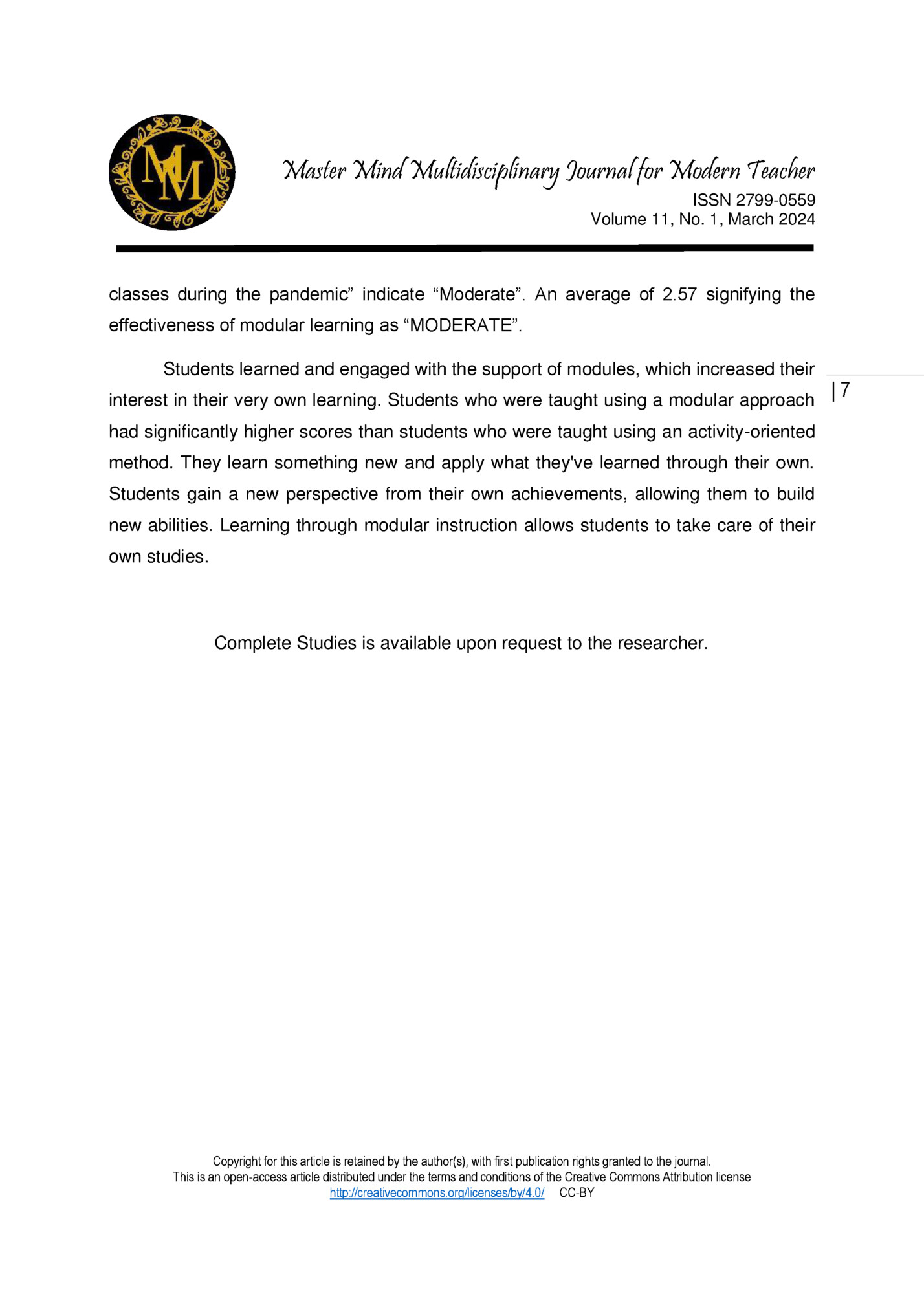
ISSN 2799-0559 Volume 11, No. 1, March 2024 Unveiling the Beauty of Algebra: A Gateway To Mathematical Mastery MARISSA P. AMAMANGPANG Department of Education Algebra, often hailed as the cornerstone of mathematics, serves as a powerful tool for understanding and solving complex problems across various fields. Its elegant language of symbols and equations enables us to express relationships, model real-world phenomena, and unlock profound insights into the structure of mathematics itself. In this exploration, we delve into the fascinating realm of algebra, illuminating its significance and beauty. At its core, algebra deals with mathematical symbols and the rules for manipulating these symbols. It empowers us to solve equations, manipulate expressions, and analyze patterns and structures. From elementary arithmetic to advanced calculus, algebraic techniques permeate throughout the mathematical landscape, providing a unified framework for problem-solving and abstraction. One of the fundamental concepts in algebra is the notion of variables. These symbols represent unknown quantities or placeholders for numbers, allowing us to generalize patterns and formulate relationships. Through the manipulation of variables and constants, algebraic expressions emerge, serving as the building blocks for more sophisticated mathematical reasoning. Equations lie at the heart of algebraic problem-solving. An equation asserts that two expressions are equal, and the challenge often lies in determining the values of the variables that satisfy this equality. Whether linear, quadratic, or polynomial, equations Copyright for this article is retained by the author(s), with first publication rights granted to the journal. This is an open-access article distributed under the terms and conditions of the Creative Commons Attribution license http://creativecommons.org/licenses/by/4.0/ CC-BY |8
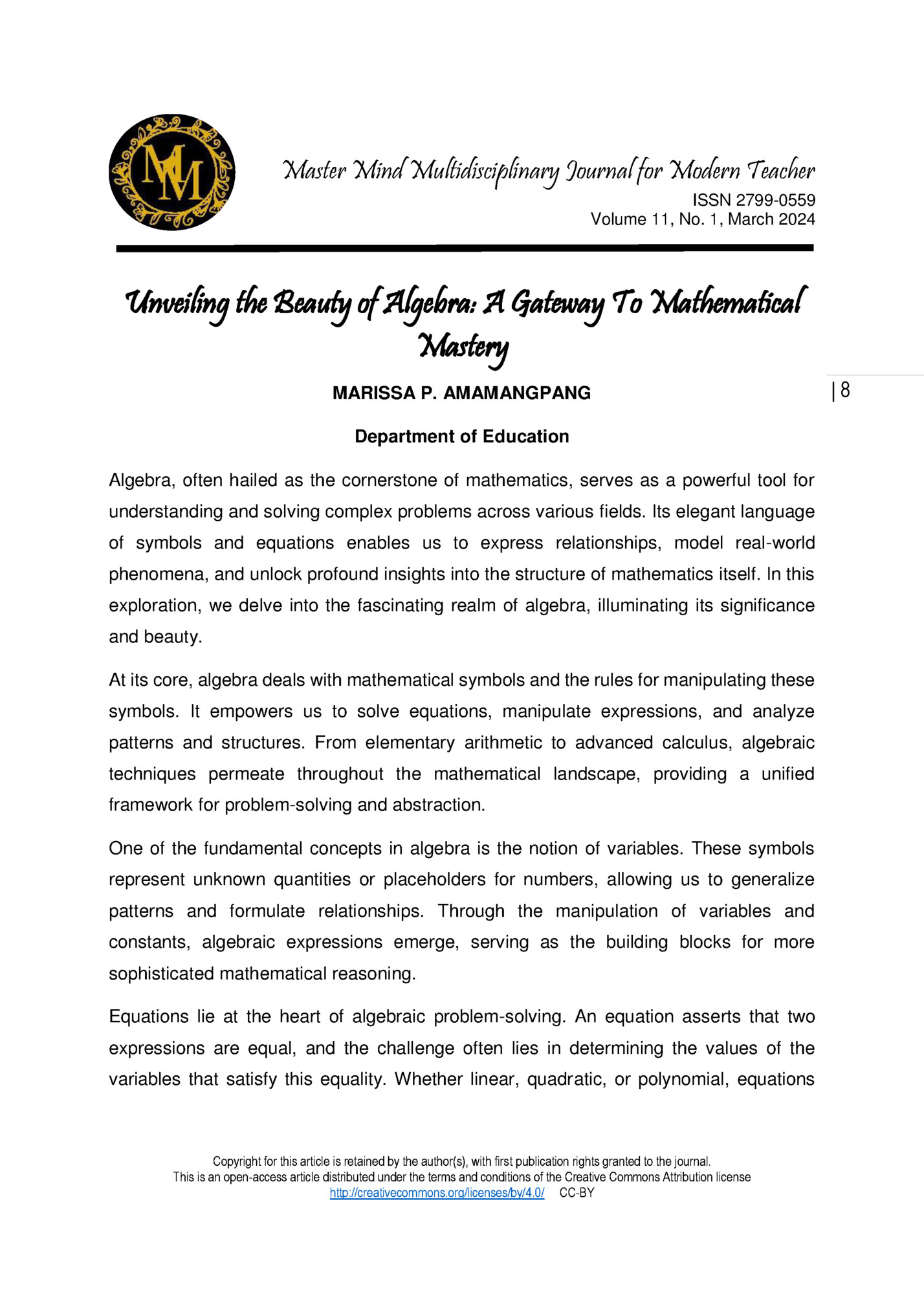
ISSN 2799-0559 Volume 11, No. 1, March 2024 offer a systematic approach to finding solutions and uncovering hidden relationships between quantities. Beyond equations, algebra encompasses a diverse array oftopics, including inequalities, functions, matrices, and vectors. Each concept adds another layer of richness to the | 9 algebraic tapestry, expanding its applicability and versatility across different domains. Whether analyzing economic trends, optimizing engineering designs, or decrypting cryptographic algorithms, algebra provides invaluable tools for understanding and navigating the complexities of the world. Moreover, algebra serves as a gateway to higher mathematics, laying the groundwork for more advanced subjects such as calculus, number theory, and abstract algebra. Its rigorous methodology and emphasis on logical reasoning foster critical thinking skills essential for success in STEM fields and beyond. By mastering algebra, students develop problem-solving abilities and mathematical fluency that are indispensable in today's datadriven society. Yet, the allure of algebra extends far beyond its practical applications. Behind its seemingly abstract symbols lies a profound elegance and beauty. The symmetrical patterns, unexpected connections, and elegant solutions that emerge from algebraic investigations evoke a sense of wonder and appreciation for the inherent harmony of mathematics. In conclusion, algebra stands as a testament to the enduring power and beauty of mathematics. From its humble origins to its far-reaching applications, algebra continues to shape our understanding of the world and inspire generations of mathematicians, scientists, and thinkers. By embracing the language of symbols and equations, we embark on a journey of discovery, unlocking new insights and transforming the abstract into the tangible. As we unravel the mysteries of algebra, we not only sharpen our minds but also enrich our appreciation for the elegance and profundity of mathematical thought. Copyright for this article is retained by the author(s), with first publication rights granted to the journal. This is an open-access article distributed under the terms and conditions of the Creative Commons Attribution license http://creativecommons.org/licenses/by/4.0/ CC-BY
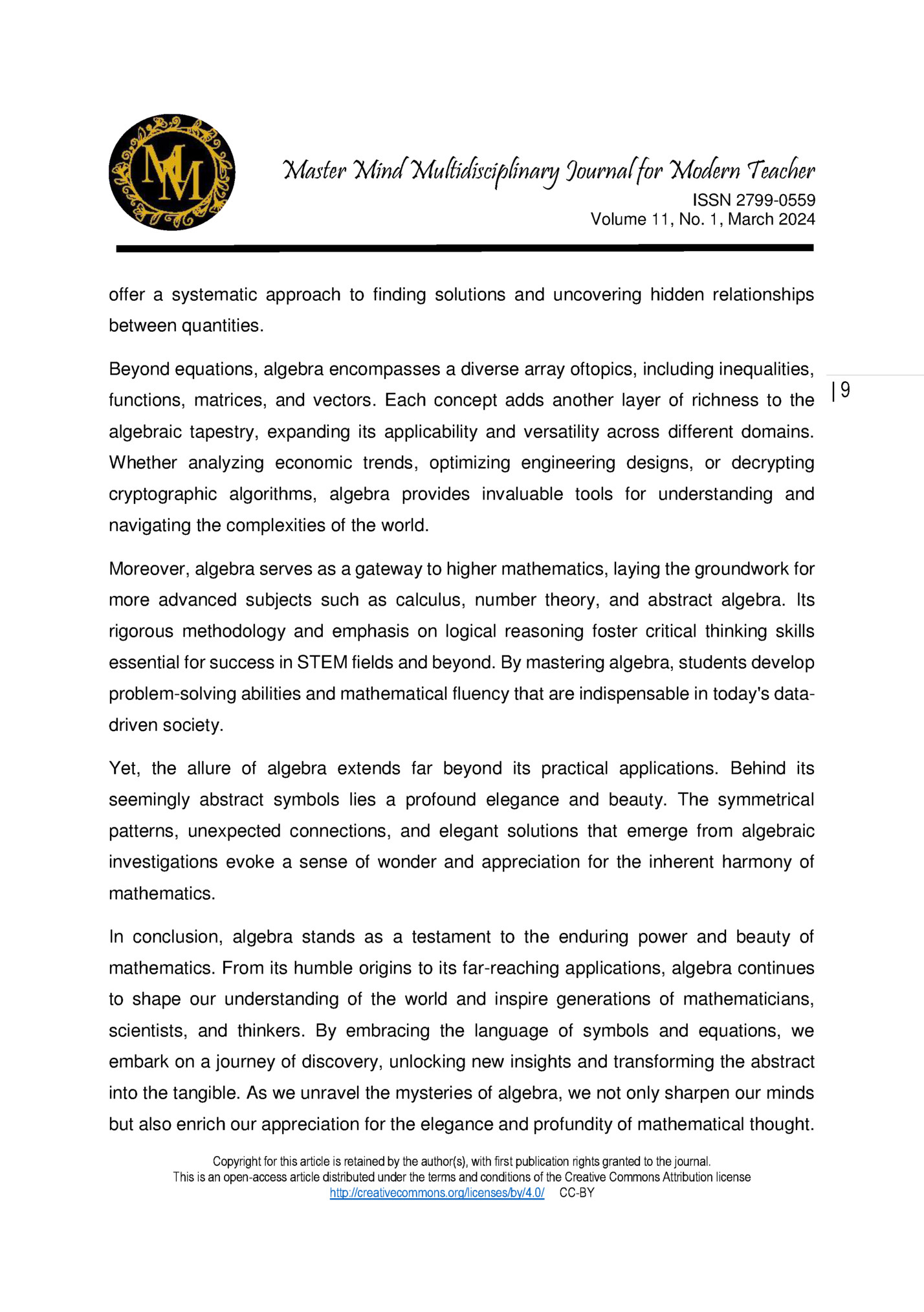
Fleepit Digital © 2021